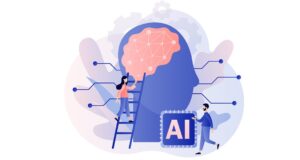AI for consumers
AI for Consumers: Responsibility and Fairness
The rise of Artificial Intelligence (AI) has brought unprecedented convenience and innovation to consumers worldwide. From personalised recommendations on streaming services to chatbots that assist with customer service,
AI technologies have become integral to everyday life. However, as AI continues to shape consumer experiences, it is crucial to address the issues of responsibility and fairness in its application.
This blog explores how AI impacts consumers, the ethical concerns surrounding its use, and the steps that businesses and developers are taking to ensure fairness and accountability in AI systems.

What is AI for Consumers?
AI for consumers refers to the use of artificial intelligence technologies to improve consumer-facing services, products, and experiences. These applications use AI algorithms to analyse large amounts of data, make predictions, and automate processes in ways that directly benefit consumers.
Examples include recommendation systems, voice assistants like Amazon’s Alexa or Apple’s Siri, autonomous vehicles, and AI-powered healthcare apps. These technologies not only simplify and personalise the consumer experience but also allow businesses to better understand and anticipate their customers’ needs.
The Importance of Responsibility in AI for Consumers
AI, by its nature, is data-driven, which means it has the potential to significantly affect how consumers are treated in various scenarios. Whether it’s the way advertisements are targeted, loans are approved, or products are recommended, the responsibility lies with the developers, businesses, and policymakers to ensure these systems are used ethically.
1. Data Privacy Concerns
Consumers often unknowingly give away large amounts of personal data when interacting with AI systems. This data, which includes sensitive information like health records, browsing habits, and personal preferences, is used to improve the AI’s accuracy and tailor experiences. However, without proper safeguards, this data can be misused.
For example, data breaches or the unethical sharing of consumer data can lead to privacy violations. Companies must be transparent about how consumer data is collected, stored, and used, ensuring compliance with data protection laws like the General Data Protection Regulation (GDPR) in Europe and the California Consumer Privacy Act (CCPA) in the United States.
For instance, Google and Apple have clear privacy policies in place to ensure consumer data protection, providing options for users to control what data is shared.
2. Accountability in AI Decisions
AI systems are often viewed as “black boxes” because their decision-making processes are not always transparent. For example, AI algorithms used in credit scoring or hiring may inadvertently discriminate against certain groups if the data fed into the system is biased. If an AI system wrongly denies a consumer credit or job opportunity, consumers need a clear path for accountability and recourse.
The AI Now Institute has highlighted the need for robust regulatory frameworks to ensure that AI systems are accountable for their actions, particularly when it comes to decisions that directly affect people’s lives. Companies like IBM have implemented transparency efforts, such as providing tools for developers to understand how their models make decisions.
Fairness in AI for Consumers
Fairness is one of the biggest concerns when it comes to AI applications, especially since AI systems are heavily reliant on historical data to make predictions and decisions. This data can often reflect human biases, whether intentional or not, leading to unfair outcomes.
1. Bias in AI Algorithms
Bias in AI algorithms can occur when the data used to train the system reflects past prejudices or imbalances. For instance, facial recognition systems have been shown to be less accurate at identifying people with darker skin tones or women, leading to unfair discrimination. This is particularly problematic in sectors like law enforcement or hiring, where biased decisions can have life-altering consequences for consumers.
Efforts to combat bias are gaining traction, with organisations such as Fairness, Accountability, and Transparency (FAT*) hosting annual conferences dedicated to these issues. Microsoft and Google have also launched initiatives to make their AI systems more inclusive and reduce bias.
2. The Digital Divide
AI can exacerbate existing inequalities if certain groups of consumers have less access to the technologies that enable them to benefit from AI-driven services. For example, lower-income consumers or those in developing regions may not have the necessary access to the internet or advanced devices to fully utilise AI services.
To tackle this, some companies are working on AI-driven solutions that aim to make technologies more accessible. For example, Google’s Project Loon uses high-altitude balloons to provide internet access to remote areas, ensuring that underserved populations can take advantage of AI-powered services.
How to Ensure AI for Consumers is Fair and Responsible
Several steps can be taken by businesses, developers, and policymakers to ensure AI is used responsibly and fairly:
1. Transparency
Businesses must be transparent about how their AI systems work, how decisions are made, and how consumer data is being used. This transparency builds trust with consumers and allows them to make informed choices. For example, AI applications should provide clear disclosures when a consumer is interacting with an AI system versus a human, and they should be able to explain how decisions are reached.
2. Bias Audits and Testing
Developers must conduct thorough testing and audits to identify and mitigate biases in AI systems. This includes evaluating AI algorithms for fairness across different demographics, such as race, gender, and socioeconomic status. Regular audits should be a standard practice for any company deploying AI to ensure that systems are evolving in line with ethical guidelines.
3. Consumer Education
To navigate the complexities of AI, consumers should be educated about AI technologies, how they impact their lives, and the rights they have when interacting with AI-powered systems. This education can empower consumers to advocate for their interests and challenge unfair or unethical practices.
4. Stronger Regulation
Governments must play an active role in regulating AI to ensure it aligns with ethical and fairness standards. The European Union’s AI Act is one of the first attempts to regulate AI comprehensively and can serve as a blueprint for other countries.
Conclusion
AI has immense potential to enhance the lives of consumers by making services more efficient, personalised, and accessible. However, with great power comes great responsibility.
To ensure that AI benefits consumers fairly, we must address issues like data privacy, algorithmic bias, and accountability. By promoting transparency, fairness, and ethical development, we can ensure that AI remains a tool for positive change while protecting consumer rights and interests.
For more information on AI’s impact and ethical considerations, explore resources from organisations like AI Now Institute, AI for Good, and The Partnership on AI.


















